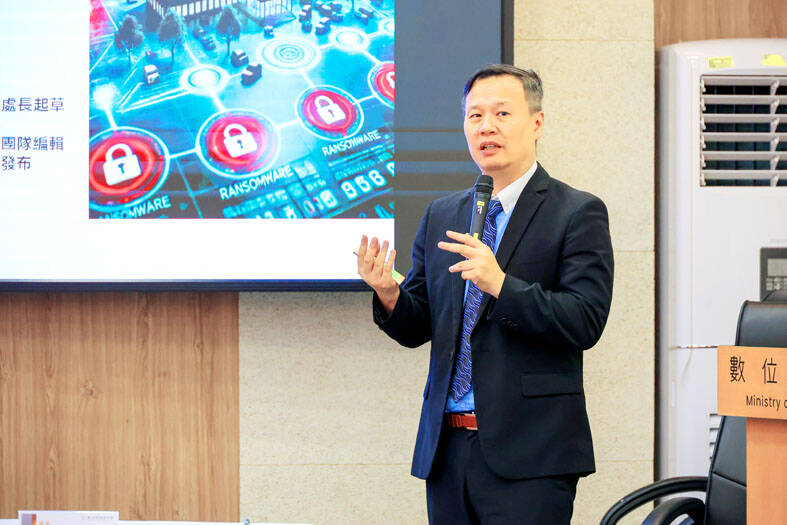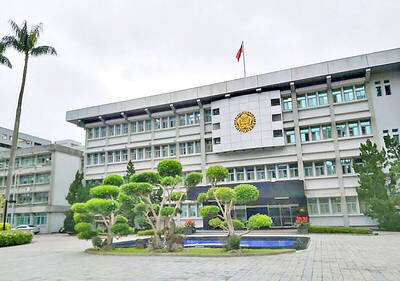The Ministry of Digital Affairs yesterday announced plans to improve cybersecurity resilience in Taiwan’s medical sector, following cyberattacks on at least two hospitals this year that were linked to a Chinese hacker.
“We are concerned that hospitals could be paralyzed by [ransomware] attacks, posing a major risk to Taiwan, while personal data could also be leaked,” Deputy Minister of Digital Affairs Lin Yi-jing (林宜敬) said.
The ministry has teamed up with the Ministry of Health and Welfare to improve cybersecurity at hospitals, which are considered critical infrastructure, Lin said.

Photo courtesy of the Ministry of Digital Affairs
Four measures — cyberdefense drills, talent development, institutional guidance and enhanced inspections — would be implemented to help hospitals defend against cyberattacks, Administration for Cyber Security director-general Tsai Fu-longe (蔡福隆) said.
One of the drills is scheduled for the end of this year, Tsai said.
Domestic and foreign white-hat hackers — experts who identify vulnerabilities in computer code and alert organizations to them — would be invited to take part in the exercise, which would focus on the medical sector, he said.
Eleven hospitals would team up in the drills to counter simulated attacks, with the aim to improve their ability to implement protective measures and file reports amid cyberattacks, he added.
“In the past, hospitals have sometimes handled such defense measures on their own, but the drills will foster closer cooperation between them and help enhance their technical capabilities,” he said.
Following a series of attacks by hackers named “CrazyHunter” earlier this year, the resilience of Taiwan’s medical sector has improved, said Lee Chien-chang (李建璋), head of health ministry’s Department of Information Management.
The “CrazyHunter” attack was a ransomware incident that crippled the computer systems of Mackay Memorial Hospital in February and Changhua Christian Hospital in March, both top-tier medical centers in Taiwan’s three-tier hospital classification system.
While no data were leaked in the Changhua Christian Hospital incident, patient information from the Taipei facility was put up for sale after the hospital refused to pay a ransom, a Criminal Investigation Bureau (CIB) probe showed.
Following the two cyberattacks, the health ministry in March issued guidelines for hospitals on how to respond to ransomware attacks, Lee said.
“The response guidelines are almost unheard of in other countries,” he said.
With the guidelines, cybersecurity staff know what to do after an incident, including what actions to take within 24, 48 and 72 hours — starting with containing the damage, identifying the malware and quickly restoring systems, he said.
All medical facilities in Taiwan have installed Endpoint Detection and Response, a cybersecurity tool that most did not have before the incidents this year, but Mackay Memorial Hospital did, meaning some of its computers were not compromised, Lee said.
In April, the CIB said that “CrazyHunter” is the alias of a 20-year-old employee of a cybersecurity company in China’s Zhejiang Province surnamed Lo (羅).
Asked whether Lo’s cybercrimes were supported by Chinese authorities, Lee said: “We cannot speculate, but it is clear that there was a specific commercial ransom issued.”
Asked whether Taiwan’s medical sector is prepared to withstand a hacking incident backed by Chinese authorities, Lee said that the government would never assume “that defenses are impenetrable and that incidents will not happen.”
The focus is on building resilience so that if systems are breached, operations could be restored immediately, he said.
“This is what we are working on now,” he added.

The German city of Hamburg on Oct. 14 named a bridge “Kaohsiung-Brucke” after the Taiwanese city of Kaohsiung. The footbridge, formerly known as F566, is to the east of the Speicherstadt, the world’s largest warehouse district, and connects the Dar-es-Salaam-Platz to the Brooktorpromenade near the Port of Hamburg on the Elbe River. Timo Fischer, a Free Democratic Party member of the Hamburg-Mitte District Assembly, in May last year proposed the name change with support from members of the Social Democratic Party and the Christian Democratic Union. Kaohsiung and Hamburg in 1999 inked a sister city agreement, but despite more than a quarter-century of

The Ministry of Foreign Affairs (MOFA) yesterday expressed “grave concerns” after Singaporean Prime Minister Lawrence Wong (黃循財) reiterated the city-state’s opposition to “Taiwanese independence” during a meeting with Chinese Premier Li Qiang (李強). In Singapore on Saturday, Wong and Li discussed cross-strait developments, the Singaporean Ministry of Foreign Affairs said in a statement. “Prime Minister Wong reiterated that Singapore has a clear and consistent ‘one China’ policy and is opposed to Taiwan independence,” it said. MOFA responded that it is an objective fact and a common understanding shared by many that the Republic of China (ROC) is an independent, sovereign nation, with world-leading

The Ministry of Justice Investigation Bureau (MJIB) has been investigating nine shell companies working with Prince Holding Group, and the Taipei District Prosecutors’ Office is seeking further prosecution of alleged criminals, a source said yesterday. The nine companies and three Taiwanese nationals were named by the US Department of the Treasury’s Office of Foreign Assets Control (OFAC) on Oct. 14 as Specially Designated Nationals as a result of a US federal court indictment. Prince Holding founder Chen Zhi (陳志) has been charged with fraud, conspiracy, money laundering and overseeing Prince Holding’s suspected forced-labor camps in Cambodia, the indictment says. Intelligence shared between Taiwan,

COOLING OFF: Temperatures are expected to fall to lows of about 20°C on Sunday and possibly 18°C to 19°C next week, following a wave of northeasterly winds on Friday The Central Weather Administration (CWA) on Sunday forecast more rain and cooler temperatures for northern Taiwan this week, with the mercury dropping to lows of 18°C, as another wave of northeasterly winds sweeps across the country. The current northeasterly winds would continue to affect Taiwan through today, with precipitation peaking today, bringing increased rainfall to windward areas, CWA forecaster Liu Pei-teng (劉沛滕) said. The weather system would weaken slightly tomorrow before another, stronger wave arrives on Friday, lasting into next week, Liu said. From yesterday to today, northern Taiwan can expect cool, wet weather, with lows of 22°C to 23°C in most areas,